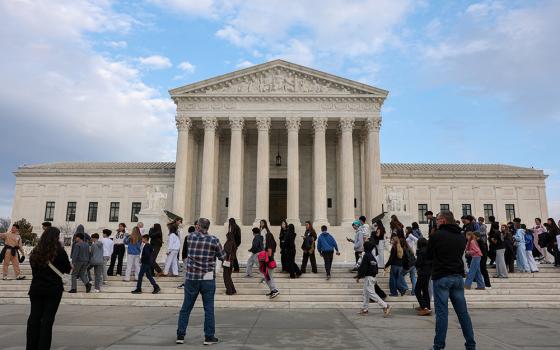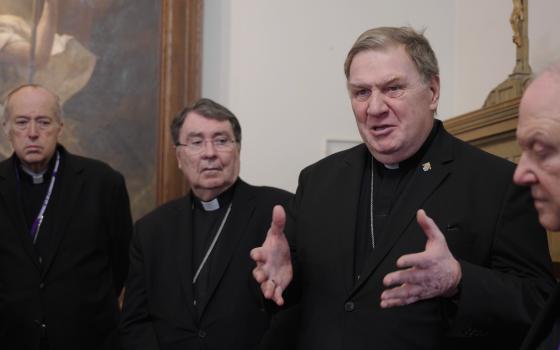
The Church in Venezuela — laypeople, priests, religious and sisters — delivers prepared meals, known as ollas solidarias, to those facing hunger. (Courtesy of Maura Aranguren)
"Which of you, if your son asks for bread, will give him a stone? Or if he asks for a fish, will give him a snake? If you, then, who are evil, know how to give good gifts to your children, how much more will your Father in heaven give good things to those who ask him!" (Matthew 7:9-11)
For more than a decade, Venezuela has endured one of the deepest crises in its history. A mix of economic, political and social factors has created a national emergency that forces people to live in constant uncertainty. Falling oil prices, widespread corruption, lack of transparency, and government control over prices, currency exchange and private enterprise have pushed the country into a downward spiral that has affected every area of life: education, health, housing, food, safety and employment.
The result has been the largest exodus in the country's history: nearly 8 million Venezuelans have left in search of better opportunities for themselves and their families. Many towns and neighborhoods have turned into "ghost communities," emptied by forced migration.
"Through spiritual accompaniment, listening circles, family support, and social projects, [every congregation in Venezuela] works for justice, reconciliation and human dignity." —Sr. Maura Aranguren

Women religious like Sr. Maura Aranguren support children and families in Venezuelan communities through education, spiritual and physical accompaniment and other forms of supportive care. (Courtesy of Maura Aranguren)
By 2016, the food crisis had become a full-blown humanitarian emergency. With severe shortages and hyperinflation, money and basic goods disappeared. People waited in long lines outside stores, often leaving empty-handed. Children and adults alike scavenged through garbage for food.
In response, inspired by Pope Francis' call during the Jubilee Year of Mercy (2015-2016), the Venezuelan Church launched ollas solidarias, or "solidarity pots" — community kitchens that provided hot meals for the hungry. Laypeople, religious and priests worked side by side to make it possible.
The initiative spread rapidly, taking root in parishes across the country. Some schools led by religious sisters joined in too, like Our Lady of Consolation School in Las Palmas, Caracas. Together with parents, students, alumni and lay partners, they prepared meals for hospitals, especially for children and new mothers. What began as a small effort soon became a powerful sign of hope for those who were hungry.
Each time we gathered to serve, it felt like answering Jesus' command: "You give them something to eat" (Mark 6:37). I thank God for allowing us to reach so many families through these simple acts of mercy. Even now in 2025, though operating at a smaller scale than during 2016-2019, ollas solidarias continue. Hunger still persists in Venezuela, where wages remain painfully low.

The olla solidaria, a symbol of hope and charity, continues to feed those most in need in Venezuela despite the persistent economic crisis. (Courtesy of Maura Aranguren)
In this reality, consecrated life — though smaller in number and aging — continues to respond with faith and courage. In this land once called "the land of grace," consecrated men and women have become a living sign of hope for those most in need. Each congregation, through the charism of its founder, has become a trusted presence among the people, a quiet testimony of resilience, faith and commitment amid hardship. They remind us that God continues to walk with his people: "I will walk among you and be your God" (Leviticus 26:12).
Every congregation in the country has taken up the mission not only to evangelize, but also to serve in education, health care and the defense of life in all its forms. Through spiritual accompaniment, listening circles, family support, and social projects, they work for justice, reconciliation and human dignity.
In my own congregation, one of our projects, Talitakum ("Little girl, arise"), supports vulnerable girls by offering them a safe space to learn, grow and receive a nourishing meal before attending school.
Consecrated life in Venezuela may seem fragile with dwindling numbers, aging members and without great resources, but it remains steadfast. It is sustained by a deep desire to continue serving our people in the midst of this complex reality. Our history as consecrated men and women is one of discernment, perseverance and faith; a continuous search for God's will and a commitment to sow peace, hope and love among the poorest, especially children, youth and the elderly.
"As members of consecrated life ... we have learned to cherish what little we have, to remain faithful to our charisms, to build fraternity and to stand with the poor." — Sr. Maura Aranguren
Advertisement
Educational initiatives such as the Venezuelan Association of Catholic Education (AVEC), Fe y Alegría in education and the Venezuelan Association of Health Care with a Christian Orientation (AVESSOC), along with theological training programs and spaces for reflection, all stand as living witnesses of a faith that refuses to give up. They remind us that faith, rooted in love, can sustain a people even in the darkest times. As Pope Leo XIV once said, "May the charity of God be the language of all hearts, for this is the hour of love and the time to build the unity the world so greatly needs."
As members of consecrated life, we have learned to value people and to work for unity and reconciliation among Venezuelans, avoiding anything that divides us. We have learned to cherish what little we have, to remain faithful to our charisms, to build fraternity and to stand with the poor. In our communities, simplicity and austerity have become a way of life — even in adversity, joy continues to shine through.
I thank God for calling me to this consecrated life, a sign of faith, love and hope for the people of Venezuela. May we, following the example of Mary, continue to respond with trust: "Let it be done to me according to your word" (Luke 1:38).







